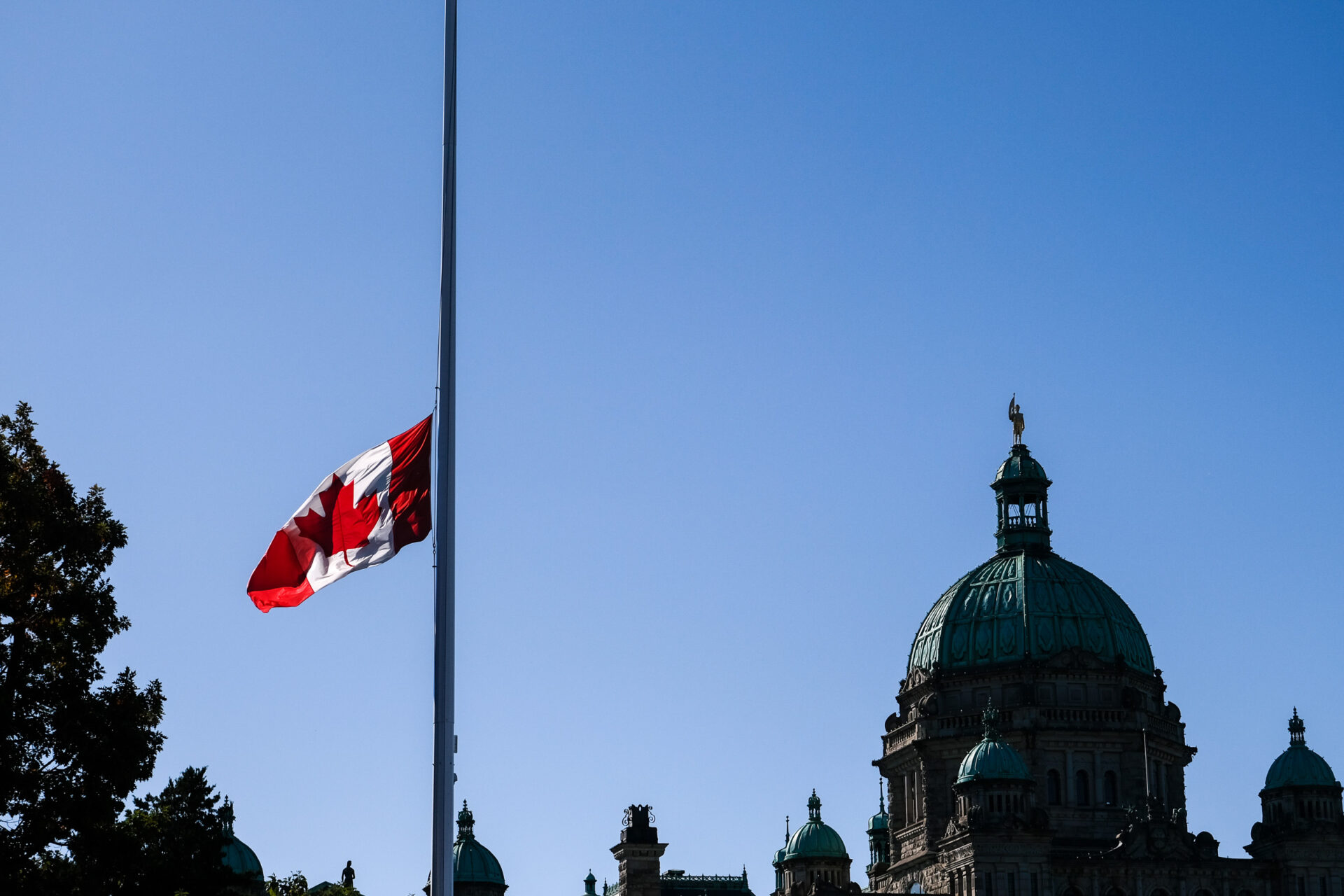“Can disappearance of an unimportant nation be worthy of serious grief?”
– George Grant, Lament for a Nation, 24
When Prime Minister Justin Trudeau described Canada for the first time as a “post-national” state it was hard not to feel he meant it with a wink and a nudge. This, after all, was also the Prime Minister who genuinely offered his own government up as genocidal, a charge that in most societies would muster up enormous moral and political muscle to right such abominable wrongs. In fact it passed, as many such pronouncements did, with less than a somewhat puzzling ripple.
It may not have occurred to the Prime Minister at the time, but he would have an advocate among what passes for intellectual heavyweights in Canada: George Grant. Grant, too, argued Canada was a “post-national” place, though it was less a cumulative success of sunny ways for Grant and more a graveside eulogy. Grant, too, would claim the passing of a substantive identity for the Canadian state effectively meant it had quit the work of real politics and now was caught within the orbit of its giant superpower neighbor, inflecting or moderating some of its more polarizing policies, but essentially hewing the line. To say, as any Canadian breathlessly will insist, that Canada is “not America” would remain a superficial rallying cry, but it would be like Mars complaining it is not “the Sun.” It is surely not, very different in many respects, and yet it is also tethered by laws of physics to its place by that same celestial behemoth. As Grant puts it, “we are like the child of some stockbroker who can enjoy the fruits of his father’s endeavours by living the swinging life, but likes to exclude from his mind where the money comes from” (11). Under those conditions, we might wonder, is President Trump really swinging so far afield to talk about a union with Canada as the “51st” state? What passes as the madness of Trump’s geopolitical machinations may be made of stronger stuff than idle fantasy. Grant, I think, would only be surprised it took so long.
While George Grant is possibly Canada’s greatest twentieth-century intellectual, most commentary on his Lament for a Nation (1965) agrees it’s a somewhat overdramatic election response. The election of 1963 was fought between two archrivals in disposition and outlook: John Diefenbaker and Lester B. Pearson. It was such a consequential election for the future direction of Canada that even celebrated journalist John Ibbitson described the rivalry as The Duel and, in subtitle, The Makers of Modern Canada, still in 2023. The issues were many, to which we will return, but the politics were also personal. In fact, there is also a bit of, what the kids call, “hot goss” that colors his trauma dumping.
Diefenbaker and Pearson came to dislike each other enormously. And George Grant, who swam in the circles of the Laurentian elite that have dominated so much Canadian politics and economics, despised Pearson especially. One reason may be Pearson’s extra-marital romance with Mary Greey, a “powerfully attractive” woman whose blue eyes made “people go absolutely weak” (Ibbitson 97). Andrew Cohen concluded that “Grant’s hostility was personal as much as intellectual” and Grant’s biographer William Christian believed that Grant never forgave Pearson who, he believed, had “strung Mary along and treated her execrably.”
On top of these Laurentian trysts was, of course, some actual policy. Pearson was, to put Grant’s complaints in a contemporary way, a globalist sellout, who cared nothing for the tradition and history of the Dominion and more for tuxedos and peace prizes and international summits. Pearson represented, to Grant, the modern, homogenizing element in American capitalism. This was a future of a country shorn of authentic, independent identity, and overwhelmed by the torrents of technology and capitalism which would force what weak elements of Canadian identity persisted into retreat and eventual oblivion. The election had as its crucible the question of Canada’s relationship to the United States of America and whether or not Canada should allow the deployment of American nuclear weapons onto its territory for continental defense. Diefenbaker defended what Grant thought of as a last line of sovereign independence, whereas Pearson was only too happy to oblige his technocratic buddies in Washington.
Alas, even Diefenbaker’s defense was doomed to failure, argued Grant. The true problem, after all, was not America, but only what America represented: the power of technology and capitalism to flatten and erase local identity, politics, language, and culture and produce one homogenous, universal technological society. This runs us into the substance of some of Grant’s justifiably celebrated political theory, especially his hallmark contribution Technology and Empire (1969).
Diefenbaker may have been no technocratic globalist, populist prairie boy that he was, but he was, alas, a capitalist. And capitalism, argued Grant, was a track that led in only one direction: post-national, universalizing, and homogenizing oblivion; technocratic-capitalist sameness. After the 1940s, argues Grant, it was “not in the interests of the economically powerful to be nationalists. Most of them made more money by being the representatives of American capitalism and setting up the branch plants” (61). Capitalism, he says, is
a way of life based on the principle that the most important activity is profit-making. That activity led the wealthy in the direction of continentalism. They lost nothing essential to the principle of their lives in losing their country. It is this very fact that has made capitalism the great solvent of all tradition in the modern era. When everything is made relative to profit-making, all traditions of virtue are dissolved, including that aspect of virtue known as love of country (61).
The breadth, plurality, and geography of Canada has always made it an unlikely country. It will surprise no one who looks at a map of North America that culture and economics move north-south much more than east-west in the continent, bonds of not only economics but also culture are more patterned after Cascadia or The Great Lakes or the East Coast. Ontario and Michigan are much more mutual economic entities than Ontario and Manitoba will ever be, or Michigan and Illinois. Eventually, argued Grant, these economic bonds corrode difference to the point of meaninglessness. Such a “society produced may reap enormous benefits, but it will not be a nation” (56).
Grant’s polemic is bad news for Canada, but, to be clear, it’s pretty bad news for America too. “Modern civilization,” he concludes, “makes all local cultures anachronistic” (67). Such a spirited clash between what Grant described as populists and globalists, or nationalists and technocratic capitalists, hardly seems confined to the eclectic electioneering of a sleepy middle power’s early 1960s. This is, to a degree, the language of today’s elections also in the United States, in Italy, in Hungary, in the United Kingdom, in France, in Germany–the list does go on. Whether Grant’s angry polemic was right or not in 1963 is about more than whether President Trump can economically headlock Canada into a political union, although to be sure it is about that, too. It is about nation and identity in the modern world. It is about what is being won, and what is being lost. And it is about winners and losers.
This gets us closer to Grant’s emotion, to his eulogy. How many in rustbelt flyover states would fail to hear the rhyme when he says that in “a lament for a child’s death, there is not only pain and regret, but also celebration of passed good –
I cannot but remember such things were That were most precious to me (24).
I do not share Grant’s instinct to clamp the jugular of capitalism, but that hardly means he’s all wrong about its corrosive power. If our governments and states are primarily concerned with market efficiency, if they are here to deliver goods at the best cost per unit, then Canada is really no different than the telephone company, and Canadians have become shareholders who periodically replace the CEO for better growth strategies. If you’re looking for what Canada’s governments believe today, what their moral and political vision is, you used to look at something we call a Speech from the Throne. Now, your better bet is to study its gargantuan budgets. We must glean what is left of Canadian national identity from our budget lockups where tombs of spreadsheets and fiscal projections offer what glimmers of public priority and identity still remain.
Wouldn’t union with the superpower to the south be more economically efficient, under those conditions? Canadians can barely trade interprovincially. Wouldn’t it make more sense to enter into a more dynamic and productive political culture? Isn’t post-national just another way of saying universal, an ideological “liberalism … whereby indigenous cultures are homogenized” (91)?
The geopolitics of this are more ominous still. Why, after all, would President Trump pick a fight with the Chinese Communist Party over, say, Taiwan, when he could do a deal that makes everyone rich? What, exactly, is the American national priority in Ukraine, a settling of which could produce a dividend of peace and prosperity? All of these geopolitical conflicts require moral categories beyond economic maximization or American interests become a thin patina over a desire for personal security and prosperity. Grant is asking, just as the resurging politics of our day is asking, do we have these moral categories? And what will we give for them?
Issue polls are notoriously irrelevant. The question is not whether, when asked, a person cares about an issue (especially in front of other people). The question is about how much you would give, what you would sacrifice. A better measure is what social scientists call revealed preferences, not what you say you care about, but where we can see you have put your time, treasure, and trust. Grant wrote that “to be a Canadian was to build, along with the French, a more ordered and stable society than the liberal experiment in the United States” (25). This was a picture of a Dominion that stretched across implausible geographies, with difficult and even duplicitous but nonetheless honorable persistence in its improvement; it was a picture of a politics more compassionate and communal than rugged American individualism, bordered and bounded by a less purely egalitarian politics. I believe in that Canada, but at what cost? The issue polls are out and Canadians, to a person, are outraged by President Trump’s economic coercion. But our revealed preferences speak louder than our pearl-clutching performative spasms: a country grappling in a death spiral with its own history, its productivity collapsing, its defense and sovereignty crumbling. Canada is and can be a great country, but the question is whether after all this free riding that potential greatness is worth more to us than the payday of continental union. In 1963 George Grant wrote,
Canada has ceased to be a nation, but its formal political existence will not end quickly. Our social and economic blending into the empire will continue apace, but political union will probably be delayed (97).
Maybe until today.
Canada has become a country much practiced at outrage. I wonder if behind all that rage we will still find the stomach for an independent Dominion, from sea to sea. It’s a money loser, to be sure, so we’ll find out together soon enough if the people and nation of Canada are anything better, anything nobler, than the telephone company. Grant didn’t think so. I pray we prove him wrong.
Image Via: Don Craig





1 comment
T Kroeker
Robert Joustra gives his own empty game away 1) by not listing Dief’s personal infidelities, and 2) retaining (against Grant) Joustra’s own Calvinist affinities with capitalism, thus revealing he really doesn’t understand Grant (or perhaps others who “pass for intellectual heavyweights” in non-Kuyperian Canada). As for “nationalism,” fill your boots!
Comments are closed.